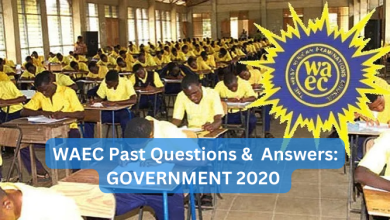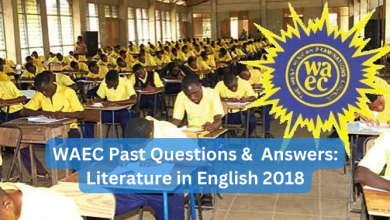WAEC Past Questions & Answer: Literature in English 2021

Welcome to our WAEC past question and answer series. In this post, we will be sharing Literature in English 2021 past questions and their answers for various subjects. Stay tuned enjoy while learning.
1. Something a character says on stage that is meant for the audience alone is
A. an epilogue
B. a mine
C. a soliloguy
D. an aside
2. A pause within a line of poetry is
A. an alliteration
B. a caesura
C. a metre
D. an assonance
3. A recurring idea, image, or a group of images that unifies a work of literature is
A. motif
B. allusion
C. legend
D. anecdote
4. When you are old and grey and full of sleep.
The rhythmic pattern of the above line is
A. anapestic
B. dactylic
C. trochaic
D. iambic
5. An inscription on a tombstone is an
A. epitaph
B. epistle
C. epigram
D. ode
6. A three-line stanza, rhymed ABA, BCB, CDC is a
A. couplet
B. haiku
C. terza rima
D. heroic couplet
7. The chorus normally features prominently in
A. poetry
B. the epic
C. the novel
D. drama
8. A story which explains a natural phenomenon or justifies the beliefs of a society is…
A. myth
B. legend
C. motif
D. fable
Read the extract below and answer questions9 to 11.
What happened to a dream deferred?
Does it dry up Like a raisin in the sun?
Or fester like a sore
And then run?
Does it stink like rotten meat?
9. The dominant literary device is
A. the epithet
B. the rhetorical question
C. verbal irony
D. paradox
10. Does it stink like rotten meat? makes use of the sense of
A. taste
B. touch
C. sight
D. smell
11. The mood of the poem is one of
A. joy
B. doubt
C. anger
D. certainty
12. A short play performed in the pause between the act of a longer play is
A. denouement
B. interlude
C. prologue
D. epilogue
13. The most intense part of a conflict is the
A. resolution
B. climax
C. denouement
D. deus ex machina
14. I feel a million times better than I felt yesterday is
A. an apostrophe
B. a euphemism
C. an irony
D. a hyperbole
15. identify the odd item:
A. third-person narrative
B. literary appreciation
C. first-person narrative
D. epistolary technique
16. A dramatist is someone who….plays
A. writes
B. dírects
C. commissions
D. promotes
17. Nando’s family lives within the lower income bracket illustrates
A. sarcasm
B. allusion
C. climax
D. euphemism
18. A dramatic performance without words is
A. mime
B. an aside
C. a monologue
D. a soliloguy
19. Utopia is a term used to describe
A. strange circumstances
B. difficult conditions
C. pleasant feelings
D. ideal societies
20. The lawyer addressed the bench illustrates
A. simile
B. oxymoron
C. alliteration
D. metonymy
Read the passage below and answer questions 21 to 25
When he was little, he would ask his mother. sometimes as he lay in the cold little room and looked up at her as she sat beside the bed stroking his hair why two boys from his class had thrown stones at a dog; or why on another occasion a gang of them had broken into an empty house, smashing the thick door which had curved mouldings on the front which had been turned by carpenters years before; or why he had ended up in a fight which had begun when a little girl had shouted names at him which made no sense about his house and his mother and others had joined in and he had rushed at them, scattering them as some shricked and some laughed and he flaied about with his hard little fists and tears in his eyes. His mother would smile, say ‘shhh’ and he would drift to sleep with the heart shape of her face imprinted on his mind.
21. The dominant feeling in the passage is that of
A. nostalgia
B. anger
C. expectancy
D. fear
22. The feelings is conveyed by the
A. mouldings on the door
B. boys; actions
C. tender care of his mother
D. little girl’s taunts
23. The dominant literary device in the passage is
A. personification
B. antithesis
C. litotes
D. parallelism
24. …and he had rushed at them, scattering them as some strieked and some laughed illustrates
A. onomatopoeia
B. climax
C. metaphor
D. metonymy
25. The main character is
A. playful
B. inquisitive
C. sad
D. humorous
Read the poem below and answer questions 26 to 30.
We wear the mask that grins and lies,
It hides our cheeks and shades our eyes,
This debt we pay to human guile;
With torn and bleeding hearts we smile
And mouths with myriad subtleties,
Why should the world be over-wise,
In counting all our tears and sighs?
Nay, let them only see us, while
We wear the mask.
We smile but O great god, our cries
To thee from tortured souls arise
We sing, but oh the clay is vile
Beneath our feet and long the mile,
But let the world dream otherwise,
We wear the mask!
26. The poem is about
A. debtors
B. dreams
C. costumes
D. appearances
27. The poet’s tone is
A. Supplicatory
B. defiant
C. conciliatory
D. compliant
28. The rhyme scheme of the first stanza is
A. aabcc
B. ababac
C. aabbc
D. abbac
29. The dominant mood is one of
A. sadness
B. fear
C. joy
D. optimism
30. We wear the mask that grins and lies illustrate
A. irony
B. personification
C. synecdoche
D. alliteration
A Midsummer Night’s Read the extract below and answer questions 31 to 35.
X: You do impeach your modesty too much,
To leave the city and commit yourself
Into the hands of one that loves you not;
To trust the opportunity of night
And the ill counsel of a desert place
Y: With the rich worth of your virginity.
Your virtue is my privilege: for that
it is not night when I do see your face,
Therefore I think I am not in the night;
31. Speaker X is
A. Hermia
B. Philostrate
C. Demetrius
D. Lysander
32. Speaker Y is
A. Titania
B. Pease blossom
C. Hippolyta
D. Helena
33. Speaker X sees Speaker Y
A. as a pretender
B. as a past lover
C. for the first time
D. for the last time
34. Both speakers are in the woods
A. to hide from each other
B. to spy on each other
C. for different reasons
D. for the same reason
35. Night evolves in the speakers’
A. huge responsibilities
B. contracting feelings
C. despairing thoughts
D. erotic feelings
Read the extract below and answer questions 36 to 40
But, masters, here are our parts, and I am to entreat you, request you, and desire you, to con them by to-morrow night; and meet me in the place wood, a mile without the town, by moonlight. There will we rehearse: for if we meet in the city, we shall be dogged with company, and Our devices known.
(Act I, Scene two Lines 79-84)
36. The speaker is
A. Bottom
B. Peaseblossom
C. Quince
D. Puck
37. The speaker is addressing
A. artists
B. painters
C. actors
D. writers
38. They intend to rehearse the play
A. a Midsummer Night’s Dream
B. Pyramus and Thisby
C. The tradegy of lovers
D. The Battle of Royal
39. The rehearsal is in preparation for
A. Egeus’ acceptance of Lysander
B. the dance of the faries
C. Theseus’ wedding
D. Titania waking up from a dream
40. The main actors will be
A. Snug and Snout
B. Philostrate and Starveling
C. Mustard-seed
D. Quince and Bottom
Read the extract below and answer questions 41 to 45
X: I pray thee, gentle mortal, sing again;
Mine ear is much enamoured of thy note;
So is mine eye enthralled to thy shape;
And thy fair virtue’s force perforce doth move me
On the first view, to say, to swear, I love thee.
Y: Methinks, mistress, you should have little reason for that: …
(Act llI, Scene One, Lines 116-121)
41. Speaker X is
A. Titania
B. Hippolyta
C. snout
D. Oberon
42. Speaker X has just
A. escaped from the city
B. fallen into a world of dreams
C. woken up from an induced sleep
D. abandoned a loved one
43. Speaker Y is
A. Quince
B. Lysander
C. Demetrius
D. Bottom
44. Speaker Y is a member of
A. Theseus’ retinue
B. Titania’s retinue
C. the group of actors
D. the group of lovers
45. Speaker X’s speech can be described as a
A. satire
B. conceit
C. paradox
D. parody
Read the extract below and answer questions 46 to 50.
If we offend, it is with our good will.
That you should think, we come not to offend,
But with good will. To show our simple skill,
That is the true beginning of our end.
Consider then, we come but in despite.
We do not come, as minding to content you,
Our true intent is.
(Act V, Scene One, Lines 108-114)
46. The speaker is
A. Flute
B. Quince
C. Bottom
D. Philostrate
47. The speech is part of the
A. prologue
B. epilogue
C. exposition
D. lyric
48. The speaker is involved in putting on
A. a scene
B. skit
C. an act
D. a play
49. The occasion is
A. the celebration of the royal marriage
B. the king’s decision to banish Hermia
C. Oberon’s threat to punish Titania
D. Titania falling in love with Bottom
50. The speech is
A. romantic
B. satiric
C. comic
D. tragic
Answers To Questions
- D
- B
- A
- D
- A
- C
- D
- A
- B
- D
- B
- B
- B
- D
- B
- A
- D
- A
- D
- D
- A
- C
- D
- A
- B
- D
- D
- C
- B
- B
- C
- D
- B
- C
- B
- C
- C
- B
- C
- D
- A
- C
- D
- D
- D
- B
- A
- D
- A
- C





